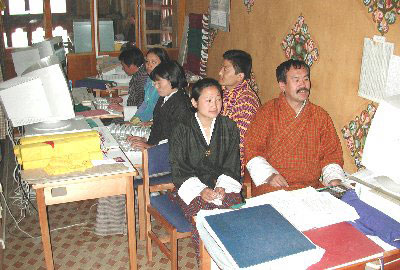|
|||
|
 |
| When the village is online, a number of initiatives can be planned. Courtesy of Per K. Sorensen. |
In our analysis, we quickly realized that access to the Internet in a developing country can be extremely costly. Various strategies to reduce the required bandwidth or the on-line time have been developed. Offline Internet is a very promising approach, explored, among others, by the TeK (Time equal to Knowledge) group at MIT. The idea is simple: when browsing the Internet, a user will only have access to pages locally stored in a big cache in the local disk. If a page is not locally stored, a request for the page will be queued, and completed the first time the machine goes online.
But a second way is offered by TeK. When users are looking for some data on the Net, they will fill a form with the necessary keywords describing their interest, the same way they would do with a common search engine. This information will be sent to a TeK server when the machine goes online. Later on, when the machine goes online a second time, the compressed results will be retrieved from the TeK server, and the users can navigate them, as they would do from the result page of any search engine. All the results of previous queries, and queries from other users, are kept stored, and they are available to all the users. Over time, TeK will build a local library with knowledge of interest to that community.
This system offers a series of clear advantages, including reduced communication costs, increased reliability, increased opportunities for policy enforcement and control. It can be used as the main tool to offer a reliable connection in the presence of unreliable power supply or Internet connectivity.
When the village is online, a number of initiatives can be planned:
- Tele-education: The wealth of knowledge available on the Internet can be an important element to support education in small communities. High-quality syllabi and class materials are cheaply available on the Internet. Educational partnerships can be set up: big schools in developed areas can offer educational support to smaller schools and communities, by offering remote assistance for grading and teaching. On the other hand, real problems of the village can be brought to classes for solutions.
- Tele-jobs: In the globalized world economy, many opportunities for tele-jobs are present. The availability of low-cost, English-speaking, skilled labor, can be exploited by international companies to reduce costs. Customers’ data can be sent digitally from abroad to the workers in the community, be processed, and sent back. A small isolated village with some computing capabilities could boost its economy this way.
- Assisted health care: Data about an isolated population could be analyzed by a remote staff of doctors in a large hospital. The presence of epidemic problems or rare diseases could be observed by expert doctors, who can warn the local health facilities. Good results have been observed in India for a similar project, focused on eye-care.
- E-post: The opportunities for cheap and reliable communication are important even for small communities, where a piece of mail can save a day otherwise spent traveling. Mail messages can be scanned, sent digitally and printed at the destination, with big savings in time, money and energy.
In the study mentioned above, we describe how the TeK software, along with other solutions (wireless connection, local networks, peer-to-peer data transfer, solar panels) can be used within the context of the five-year Bhutan Education Master Plan to reduce the costs of the introduction of Internet connection to the schools. But more than that, we show how simple IT solutions can be used to connect villages with limited or no electricity, and limited or no Internet connection, to the information available on the Internet.
The opportunities offered by the Internet to developing communities are endless, and the means for implementation are available. ICTs can open the way to a de-materialized and more sustainable path of growth for the world’s poor: it is the responsibility of the research community to direct its energy where it can be the most effective to the world population.
Please contact:
Diego Puppin, ISTI-CNR
Tel: +39 050 315 3003
E-mail: diego.puppin@isti.cnr.it


